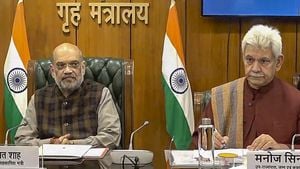HBO’s much-anticipated series, Dune: Prophecy, debuted with its first episode titled "The Hidden Hand," taking fans on a thrilling adventure set 10,000 years before Paul Atreides’ rise to power. This prequel exposes the complex beginnings of the pivotal Bene Gesserit sisterhood—an influential order known for pulling the strings of the vast interstellar politics within the Dune universe.
Within its first episodes, the series unravels the early fabric of the Bene Gesserit, portrayed through the lives of Valya and Tula Harkonnen, played by Emily Watson and Olivia Williams, respectively. The Harkonnen sisters are positioned against the backdrop of the tumultuous era known as the Butlerian Jihad, where humanity has fought and triumphed against sentient machines—an act leading to the prohibition of all forms of thinking technology.
Audiences are introduced to Valya and Tula amid the flux of post-war society, standing as distant ancestors to iconic villains like Baron Vladimir Harkonnen and even Paul Atreides. The ambiguity of their family’s past is layered with the transition from being feared liars to obscure figures contending for power. Valya has sworn to assert her family's legacy, challenging the Atreides narrative of heroism, which has relegated the Harkonnens to the title of traitors.
The series opens with flashbacks to the Butlerian Jihad and quickly moves to the sisterhood's clandestine operations. Valya is poised to take over the Bene Gesserit from Raquella Berto-Anirul who aims to establish secret breeding programs for royal unions to control future rulers. This early plan mirrors the long game played by the Bene Gesserit millennia later, culminating in their relentless pursuit of producing the Kwisatz Haderach—a male figure able to access all ancestral memories and foresee future events.
Early on, Raquella, the sitting Mother Superior of the Bene Gesserit, passes on cryptic prophecies and bombshell secrets to Valya. During her last moments, she warns Valya of dire omens involving “red dust” and “Titan-Arafel,” thrusting Valya’s earnest commitment to the Bene Gesserit mission. The series encapsulates the tense factionalism within the group, showcasing Valya’s struggle against Reverend Mother Dorotea, who disagrees passionately with Raquella’s breeding projects. This conflict serves as the thematic heart of the first season.
Fast-forward three decades, and Valya has ascended as the Mother Superior, making power moves by positioning Princess Ynez—the Emperor's daughter—within the sisterhood’s ranks amid political tumult. Yet the machinations are shaky; Ynez's political marriage to the naïve child heir of House Richese meets disastrous turns, fueled by the ambitious Desmond Hart, played by Travis Fimmel, who brings with him mystical powers hinting at genuine concern for the balance of power.
Through the episodes, audiences witness intrigue, scandal, and the strategic moves made by both the Bene Gesserit and the reigning political figures, all under the specter of Valya’s past connections and the unpredictable tides of destiny laid out by Raquella’s ominous foretelling.
Despite its deep ties to Frank Herbert's original vision, Dune: Prophecy draws on the creative efforts of author Brian Herbert and Kevin J. Anderson, whose prequel novels expanded the Dune universe. Specifically, the series derives inspiration from Sisterhood of Dune, which chronicles the evolution of the sisterhood after humanity's hard-won victory against the machines. Yet the show is not strictly bound to its source material, playing with timelines and introducing new storylines reflecting the personal dynamics among key characters.
The opening scenes resonate with rich lore, as Valya, still reeling from her family's disgrace, begins to craft her path to redemption and revenge. Her deep-rooted resentment toward the Atreides, the progenitors of her family’s fall from grace, propels her ambitions to solidify her order’s influence over the corrupt elite of the Imperial class.
Showrunner Alison Schapker acknowledges the delicate balance between honoring the established lore and creating fresh narratives. Watson echoed this sentiment, emphasizing the depth she finds within her character and the entire intricacy of the story. With the complex web of relationships at play, interactions between Valya and Ynez provoke moments rife with uncertainty. Every alliance, be it familial or political, teeters on the edge of betrayal, ensnared by the duality of loyalty and ambition.
Fans of the franchise can expect much more than the usual political drama associated with the Dune stories. The show adds emotional weight through personal stakes, infusing the grand narrative with the fragility of personal relationships—a move showcasing how power dynamics can warp familial ties and moral compasses.
Looking closely at the characters’ relationships, Valya’s joint political maneuvering with characters such as Desmond Hart delivers chilling consequences throughout the episodes. While their initial arrangements seem harmless, it’s soon evident the stakes are higher than mere political marriages—they may herald catastrophic events with sweeping ramifications across the entire Imperium.
While the complex lore may seem overwhelming at times, Dune: Prophecy doesn’t shy away from introducing casual viewers to the intricacies without isolations, crafting episodes with filming touches akin to cinematic storytelling. The series evokes highly familiar settings aboard the imperial palace, crafting expansive landscapes engaging with new planets and their ideologies.
The series highlights the significance of spice—melange—reinforcing its overarching importance within the universe. The spice enables interstellar travel, augments human abilities, and even prolongs life, weaving itself intricately through every plot point portrayed. Key to this narrative flow is the burgeoning dynamic between the Bene Gesserit and House Corrino, illustrated through the bride-to-be dynamics, with Ynez poised at the center of the storm as the ingenious turn of events gravitates toward chaos.
The characters’ struggle for power also reflects modern political undercurrents, alluding to contemporary debates around technology, surveillance, and individual empowerment, explorations facilitated by Schapker and her dedicated team. Issues around artificial intelligence and the human experience resonate throughout the show, connecting its historical narrative to present-day societal dilemmas.
Set against the sprawling backdrop of political intrigue and personal ambition, Dune: Prophecy extends the Dune saga, providing fans with rich character development and moral ambiguity. By drawing on its antecedents, the series primes itself to explore the age-old questions of power, family, and sacrifice—all fuelled by the spiraling chaos inevitably tethering to human instincts. This exploration is particularly poignant as viewers witness how the actions of past generations continue to shape the tangled paths of their descendants.
With its dazzling world-building and character-driven narratives, Dune: Prophecy is shaping up to draw viewers—both new and veteran fans—into its orbit, capturing some of the most enthralling elements of the original novels. Each episode releases weekly on HBO, tantalizing eager fans awaiting the next twist in this sprawling saga with its rich lore and mesmerizing characters.



